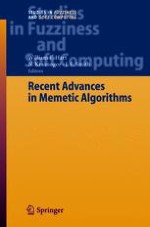2005 | OriginalPaper | Buchkapitel
A Memetic Learning Classifier System for Describing Continuous-Valued Problem Spaces
verfasst von : David Wyatt, Larry Bull
Erschienen in: Recent Advances in Memetic Algorithms
Verlag: Springer Berlin Heidelberg
Aktivieren Sie unsere intelligente Suche, um passende Fachinhalte oder Patente zu finden.
Wählen Sie Textabschnitte aus um mit Künstlicher Intelligenz passenden Patente zu finden. powered by
Markieren Sie Textabschnitte, um KI-gestützt weitere passende Inhalte zu finden. powered by
Learning Classifier Systems have previously been shown to have some application in deducing the characteristics of complex multi-modal test environments to a suitable level of accuracy. In this study, an accuracy-based Learning Classifier System, XCS, is used. The system has the capability of inducing a set of general rules from a sample of data points using a combination of Reinforcement Learning and a Genetic Algorithm. The investigation presented here builds on earlier work in this area by considering the application of a memetic approach during learning. The motivation for this investigation is identify if any increases in learning speed and classification performance can be made. The type of memetic learning used is based on Lamarckian Evolution but has several subtle differences from the standard approach. In particular, the Learning Classifier System is based on a Reinforcement Learning paradigm that has a dynamic effect on the fitness landscape. And, the form of lifetime learning used is based on a Widrow-Hoff delta rule update procedure in which changes to an individual’s genotypic description are based upon some distance measure between the individual and a “focal rule”’ (analogous to a local optima in a standard MA). In addition, no distinction is made between genotype and phenotype. Initial investigations focus on the effects on performance for three different learning rates and three different “focal rule” identification options for two different test environments - a two-dimensional and a decomposable six-dimensional test environment. Results show that improvements can be made over a non-memetic approach. The study also considers the use of a self-adaptive learning mechanism. Self-adaptation has been suggested as beneficial for Genetic Algorithms where the technique is usually used for adapting the mutation rate in a time-dependant and decentralised way. However, the investigation of a self-adaptive learning mechanism presented here focuses on the benefits of adjusting the Widrow-Hoff learning rate used within the memetic-learning component of the system. The mechanism was applied to both test environments. Results show that the mechanism can provide a more robust learning system both in terms of reduction in the number of system parameters and increased generalisation and solution convergence. Further detailed analysis of experimental results for the decomposable six-dimensional test function is also performed. This would otherwise be non-trivial for a non-decomposable six-dimensional function. The classification accuracy of several different versions of the system including those systems with and without memetic or self-adaptive memetic learning are analysed region by region showing the effects of the new learning approach at a much greater level of detail. Analysis shows that the self-adaptive memetic version of the classifier system outperforms the non-adaptive and non-memetic versions in some of the regions.
